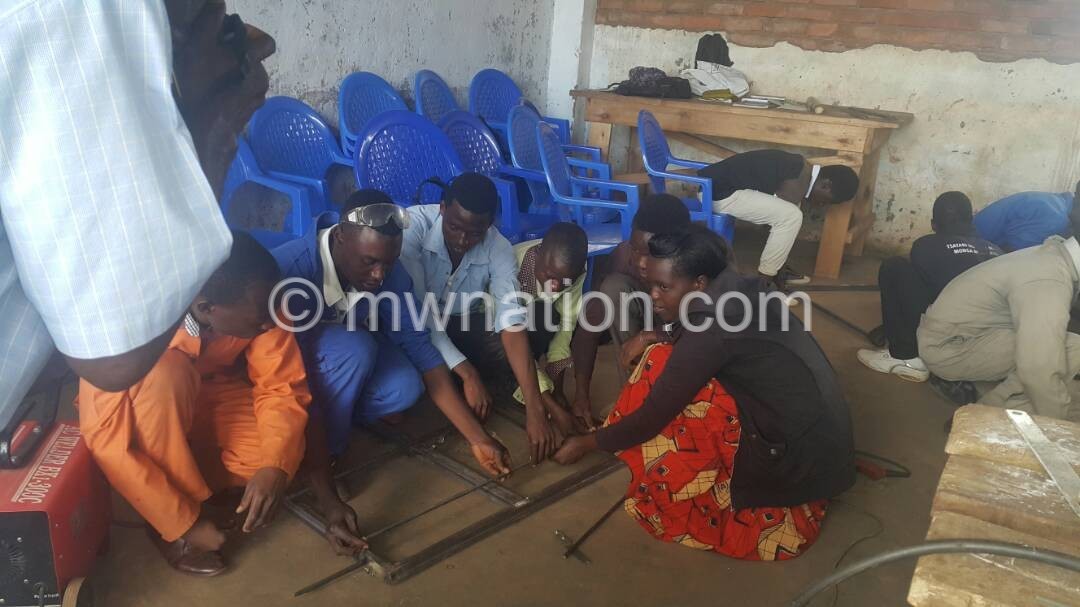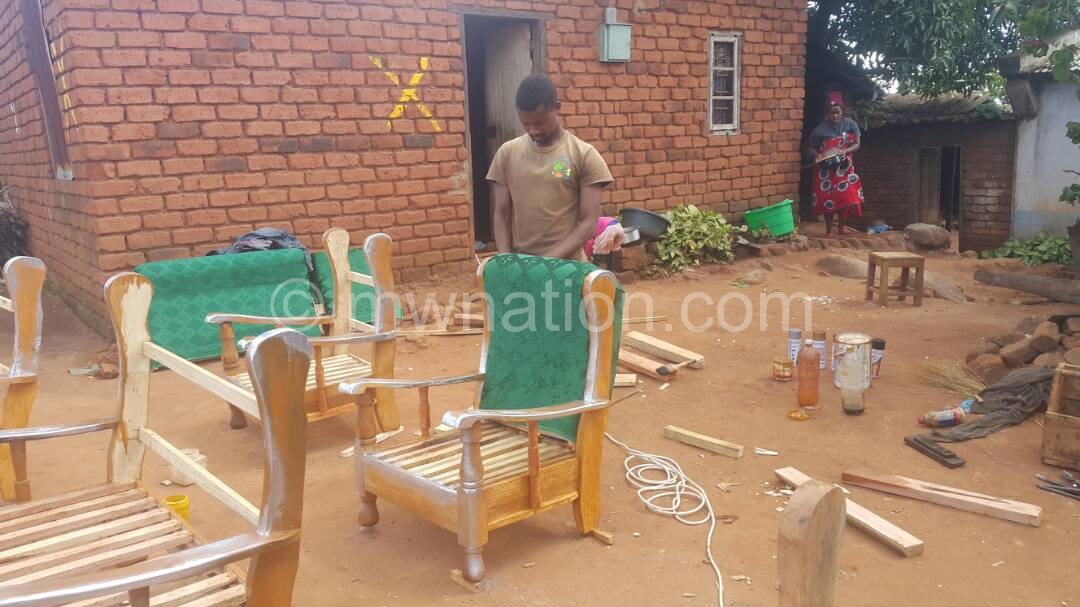Economic turnaround for rural Ntambanyama
When 25-year-old Christopher Maliro enrolled for a carpentry and joinery course at Ntambanyama Community Skills and Development Centre in Thyolo, he embarked on a journey that would change his life and that of his small family.
Now the proud owner of a carpentry and joinery workshop in Njovu village, Traditional Authority (T/A) Khwethemule— Maliro—a first cohort graduate in the field earns between K80 000 to K100 000 a month from selling his merchandise which consists mainly of sofa sets.

“I have a steady income with which I fend for my little girl and wife. Things are different from the time I rolled out my business and comparing to when I lacked any skills.
“However, although I have made economic strides, I use poor, improvised equipment which makes the work harder and slower. I believe that with an access to a loan, I shall grow my business and earn much more,” said Maliro.
Following the inception of Ntambanyama Community Skills and Development Centre by Technical Education, Vocational and Entrepreneurship Training Authority of Malawi (Teveta) two years ago, the area has become a skills galore.

At just K8 000 per six months duration of a course, many have been redeemed from an economic oblivion to becoming masters and mistresses of their destinies through employment and self-employment.
Christina Issa teaches design and tailoring at Ntambanyama, an employment she secured upon completion of the same course in the first cohort in 2015.
“A vacancy was advertised for the class and I applied and was picked. I happen to have been one of the two fast learners, hence, my reputation was self explanatory,” she smiles boastfully.
This economic transformation is all thanks to one woman who hatched an idea for her constituency.
Her dream was to make part of her area economically independent and one of the means to end poverty would be to empower the many constituents who lacked skills.
Mary Navicha Thom, member of Parliament (MP) for Thyolo Thava— according to her personal assistance Watson Suluma— approached Teveta with a proposal to set-up a training centre at Ntambanyama.
Suluma told journalists during a media tour recently that Teveta responded by surveying the area.
The result of that survey, he said, bore the Ntambanyama Community Skills and Development Centre which is now bustling with men and women trainees.

The centre, officially opened on September 18 2015, and is now home to vocational skills training in carpentry and joinery; tailoring and design; fabrication and welding; and brick-laying.
Since its inception, Suluma observed that Ntambanyama residents and those surrounding the area have managed to secure employment within the surrounding tea estates as well as open up own businesses through the acquisition of a certificate upon qualification.
“We have also employed some of our own graduates at Ntambanyama and are now training new recruits,” he said.
He said the choice of courses was derived from the villagers who specified on what exactly they wanted in tandem with their needs and environment.
Suluma said the villagers went further to identify eight people to be trained as teachers for the various courses whom Teveta trained for one week and certified before roll out.
According to the personal assistant, the first cohort graduated 103 students in the various four courses, but it initially recorded 103.
He said the second cohort graduated 72 after initially registering 86. The third cohort started on February 20 2017 with 96 who are yet to graduate.
“We have challenges of course which include drop outs and delayed funding for teachers’ salaries. However, courses such as the fabrication and welding; and carpentry and joinery manage to secure orders from companies while in training, hence, provide funding to the centre from selling their products.
“The dropout outs are sometimes due to lack of fees by the students, but the money [K 8 000] we collect from students is used to pay three guards,” he said.
On the provision of loans to aid graduates, Tevet Regional Service Centre manager–South Elliot Mulanje said Teveta joined hands with Opportunity Bank of Malawi (OBM) to make loans easily accessible by graduates who have undergone through skills training in the country.
Said Mulanje: “This arrangement was established after realising that most, if not all commercial banks require collateral of some sort from people who want to access loans. Graduates who want to access loans through this arrangement do not need to have collateral to OBM, other than proof of their skills gained by producing Tevet certificates.
“These loans can be accessed as individuals [at a maximum of K600 000], depending on business need or by groups [in which case, individuals can pool together their respective loans, if they need to purchase some equipment or machinery that require more resources than the K600 000]. Groups can be between five and 10 individuals.”
Mulanje said Teveta targets unemployed and out of school youths, the vulnerable, master craftsmen (trainers that are used by Teveta to impart knowledge and skills on trainees), artisans, micro-entrepreneurs, traditional apprentices, the marginalised and disadvantages groups including women and orphans.




